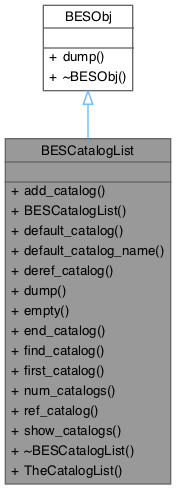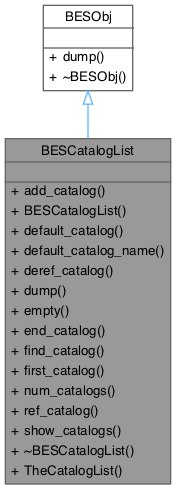List of all registered catalogs. More...
#include <BESCatalogList.h>


Public Types | |
| typedef std::map< std::string, BESCatalog * >::const_iterator | catalog_citer |
| typedef std::map< std::string, BESCatalog * >::iterator | catalog_iter |
Public Member Functions | |
| virtual bool | add_catalog (BESCatalog *catalog) |
| virtual BESCatalog * | default_catalog () const |
| The the default catalog. | |
| virtual std::string | default_catalog_name () const |
| The name of the default catalog. | |
| virtual bool | deref_catalog (const std::string &catalog_name) |
| virtual void | dump (std::ostream &strm) const |
| dump the contents of this object to the specified ostream | |
| virtual int | empty () const |
| virtual catalog_citer | end_catalog () const |
| Iterator to the last catalog. | |
| virtual BESCatalog * | find_catalog (const std::string &catalog_name) const |
| virtual catalog_citer | first_catalog () const |
| Iterator to the first catalog. | |
| virtual int | num_catalogs () const |
| The number of non-default catalogs. | |
| virtual bool | ref_catalog (const std::string &catalog_name) |
| virtual BESCatalogEntry * | show_catalogs (BESCatalogEntry *entry, bool show_default=true) |
Static Public Member Functions | |
| static BESCatalogList * | TheCatalogList () |
Friends | |
| class | BESCatalogListTest |
Detailed Description
List of all registered catalogs.
Catalogs are a way of organizing data into a tree. Every BES daemon has at least one catalog, the default catalog (confusingly named 'catalog.') In general, this is the daemon's local file system.
Multiple BESCatalog objects can be registered with this list. However, most installations have a single catalog registered (the default catalog) which provides access to files on the host computer's local file system.
Each catalog in the list must have a unique name.
The BESCatalogList class is a singleton. The catalogs (represented by specializations of the BESCatalog class) are held in a reference-counted list. Handlers typically try to add the catalog they use, and if that fails because the catalog is already in the list, they increment its reference. See add_catalog() and ref_catalog(). When the singleton's instance is deleted, so are all of the catalogs, regardless of their reference count.
- See also
- BESCatalog
Definition at line 84 of file BESCatalogList.h.
Member Typedef Documentation
◆ catalog_citer
| typedef std::map<std::string,BESCatalog*>::const_iterator BESCatalogList::catalog_citer |
Definition at line 103 of file BESCatalogList.h.
◆ catalog_iter
| typedef std::map<std::string,BESCatalog*>::iterator BESCatalogList::catalog_iter |
Definition at line 102 of file BESCatalogList.h.
Member Function Documentation
◆ default_catalog()
|
inlinevirtual |
The the default catalog.
Definition at line 118 of file BESCatalogList.h.
◆ default_catalog_name()
|
inlinevirtual |
The name of the default catalog.
Definition at line 116 of file BESCatalogList.h.
◆ dump()
|
virtual |
dump the contents of this object to the specified ostream
This method is implemented by all derived classes to dump their contents, in other words, any state they might have, private variables, etc...
The inline function below can be used to dump the contents of an OPeNDAPObj object. For example, the object Animal is derived from BESObj. A user could do the following:
Animal *a = new dog( "Sparky" ) ; cout << a << endl ;
And the dump method for dog could display the name passed into the constructor, the (this) pointer of the object, etc...
- Parameters
-
strm C++ i/o stream to dump the object to
Implements BESObj.
◆ empty()
|
inlinevirtual |
Definition at line 113 of file BESCatalogList.h.
◆ end_catalog()
|
inlinevirtual |
Iterator to the last catalog.
Definition at line 133 of file BESCatalogList.h.
◆ first_catalog()
|
inlinevirtual |
Iterator to the first catalog.
Definition at line 130 of file BESCatalogList.h.
◆ num_catalogs()
|
inlinevirtual |
The number of non-default catalogs.
- Todo
- Change this to include the default!
Definition at line 112 of file BESCatalogList.h.
Friends And Related Symbol Documentation
◆ BESCatalogListTest
|
friend |
Definition at line 99 of file BESCatalogList.h.
The documentation for this class was generated from the following file: